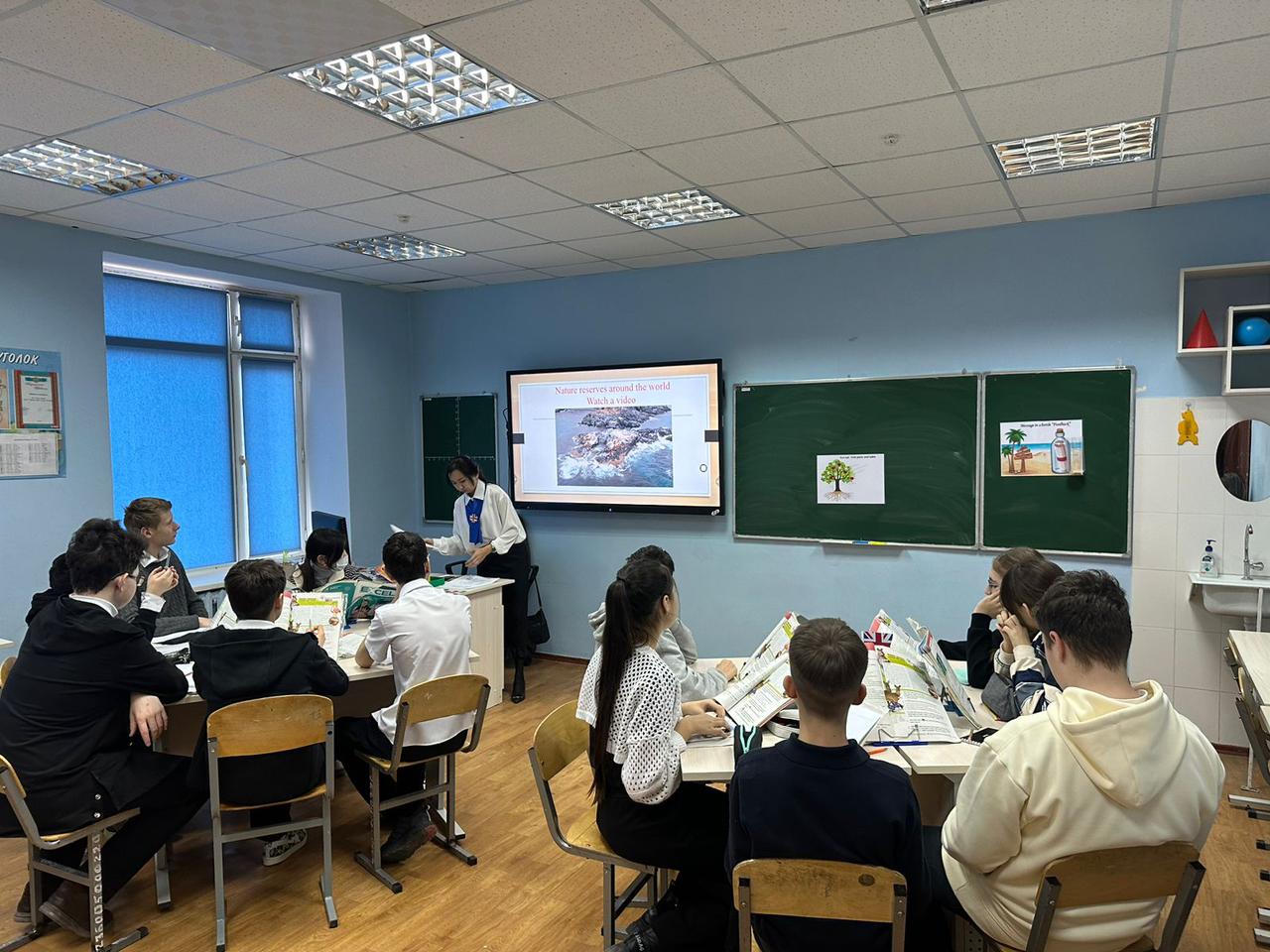Development of creative and intellectual abilities in English lessons
4 наурыз, 11:33 | Жаңалықтар

Today, an urgent problem of secondary schools is the formation and development of creative and intellectual abilities among students, since the main direction of modernization of secondary schools at the present stage provides, first of all, improving the quality of knowledge acquisition, practical and creative training of school graduates. English, as a general educational subject, can contribute to the development of students' creative abilities, as well as their independence. Students have a huge potential for creativity. And an English lesson allows you to fully develop the creative potential of students, promotes the development of creative activity, independence, and involves all students in educational activities, which should be motivated and interesting enough.
Learning a foreign language is hard. Many children who start learning a foreign language at school find it fun and amusing. But after a while they begin to realize that it is not easy at all, and soon a foreign language becomes one of the least favorite subjects. The question arises: why? How can we ensure that the interest is constant and sustainable? One of the reasons that leads to this result is the difficulty in learning grammar. Traditional methods of explanation and training do not lead to the desired result. Learning is more effective if students are actively involved in the process.
Every teacher strives to make their lessons creative and entertaining, so that the desire and interest of students who have just started studying a foreign language will not fade in the following years. The task of the teacher is to ensure that this interest is constant and sustainable. And where there is interest, there is success. Therefore, it is important to choose such forms and methods of education that would allow each child to show their activity, their creativity.

I would single out the following forms of work on the development of students' creative abilities:
• Practical exercises,
• the use of songs and poems;
• Creative homework;
• application of computer programs;
• protection of abstracts and projects;
• role-playing games, conferences;
• work with text, dialogue or monologue, constructed in an unusual way.
A real opportunity to develop the creative abilities and personal qualities of a student at school is non–traditional forms of lessons. An unconventional lesson is an organic combination of education, development and upbringing. Children like non–traditional lessons because they are creative and unusual, and most importantly, effective. Interesting forms of the lesson have a certain emotional mood of the students, which greatly facilitates the creative formation of a personality, and at the same time further work on the linguistic and grammatical aspects of the English language. By learning, reproducing, modeling and staging real life situations, poems, songs, fairy tales in a foreign language, students become familiar with the culture of the country of the studied language, master the communicative minimum sufficient for both every day and professional foreign language communication
Non-traditional forms of the lesson that develop the creative abilities of students include: a performance lesson, a lesson-the performance of a fairy-tale plot, a fantasy lesson, a game lesson, a travel lesson, a competition lesson, an open-minded lesson, a competition lesson, a dialogue lesson, a KVN lesson, a brainstorming lesson, a lesson-quiz, lesson-debate, lesson-tournament, lesson-competition, creativity lesson, lesson-project, lesson-excursion, lesson-presentation. I try to put all these forms of the lesson into practice to one degree or another.
Creativity, as we have noted before, presupposes independence, independence, originality of thinking, richness of relationships, flight of imagination and scope for activity. Taking this into account, for the development of creative activity of students, I use the following techniques: gaming, speech activation techniques in role-playing, creative contests (readers, translators) problematic creative tasks, communicative tasks, multimedia presentations, a training technique "cinque", creative modeling, a training technique "one word".
Here are simple techniques that I use in my teaching activities:
1 - creative work with poems, songs at the initial stage of training, namely, their performance by roles.
Using singing in the classroom, we solve several tasks: singing helps to improve foreign language pronunciation, develops memory, and carries great aesthetic and educational potential. In addition, singing brings variety to the lesson, relieves fatigue.
a) To memorize the forms of the verb to be, the guys and I sing a song
"I am you are" to the tune of the song "A Christmas tree was born in the forest".
I am, he is, she is, it is, we are, you are, they are.
I am, he is, she is, it is, we are, you are, they are.
или
I am happy you are happy
He is happy she is happy
It is happy
We are happy they are happy to.
There are different ways to encourage children to be active, but the most effective are play, creativity and curiosity. Nowadays, games are an integral part of English language learning.
The game "Animals" ("Animals")
Speech task: to train students in the names of various animals, in the use of personal pronouns with the verb to be.
The students are standing in a circle. Each participant has a drawing of an animal or holds a toy in his hands. The children take turns naming the animal of the neighbor on the right and their own animal.
The "Pass the question" game.
The task of this game is to develop oral speech skills.
The teacher passes the ball to the student and asks a question. The student, having answered the question, passes the ball to another student with his question, etc.
The teacher passes the ball to the student and asks a question. The student, having answered the question, passes the ball to another student with his question, etc.
The game "Snowball".
This game helps students to memorize new words quickly. The first student calls the word, the second repeats the word of the first, the third – the word of the first, second, his own, etc. If necessary, we translate the words into Russian.
The game "Train"
The task of this game is to practice verbs and the modal verb can.
Children line up one after another, like train cars, move around the class, while practicing verbs in speech and performing appropriate movements, and the modal verb can is also being worked out in speech.
When applying the studied vocabulary, I use role-playing games.
Students like role-playing games such as "In the store". I propose to play out a dialogue between the seller and the buyer (we use natural visibility – fruits, vegetables, educational supplies; "Another age" players are invited to imagine themselves younger or older and talk about themselves taking into account these age characteristics;
I would like to share my practical experience of combining regular and extracurricular work on the subject. For example, after learning the alphabet in 2nd grade, at the end of the year, I hold an ABC-party matinee. Children read poetry, sing songs about the alphabet. When studying the names of flowers in elementary grades, as an additional task, I suggest that children draw an abstract picture using as many colors and paints as possible. Then I ask the children to name the colors used in the painting in English. For the generalizing lesson on the topic "Family", children draw their family tree. A round table discussion "Me and my family" is held in the lesson. For this lesson, children learn poems about family members at will. Also, holidays such as Christmas and Valentine's Day are not ignored. The foreign language week also ends with a holiday. Children perform songs and poems in English.
Thus, it can be concluded that the more diverse methods and techniques are used, the more effective the results. And the teacher will be able to achieve the desired result only if he himself is not alien to creativity, constant search, creation. If children feel support and admiration, feel joy from their work, then they are ready to create again, to storm the heights of creativity.
Маңғыстау облысы Ақтау қаласы
«№9 жалпы білім беретін мектеп» КММ
Дайындаған ағылшын тілі пәні мұғалімі: Сартбаева Алина Бахытовна
440
Маңғыстау Медиа
Редакциялық пікір мақала авторлары мен оқырмандардың пікірлеріне сәйкес келмеуі мүмкін. Жазба және пікірлердегі ақпараттың дұрыстығы үшін авторлардың өздері жауапты.




